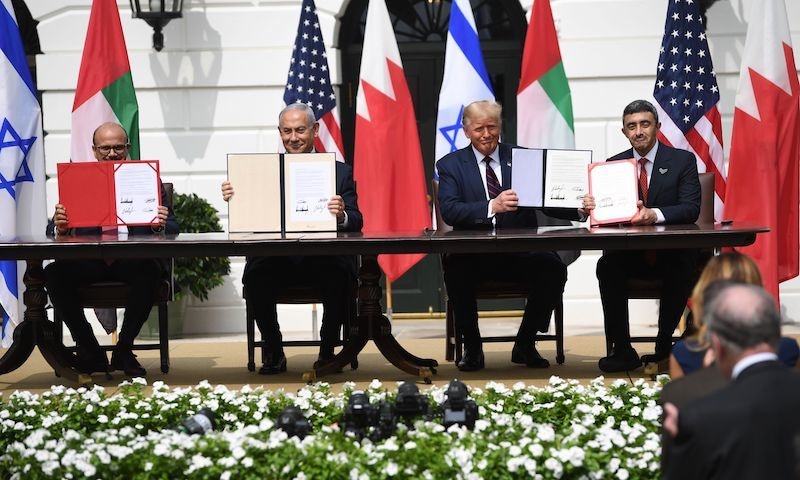The United Arab Emirates and Bahrain signed agreements on Tuesday for normalising relations with Israel, becoming the latest Arab states to break a longstanding taboo in a strategic realignment of Middle Eastern countries against Iran.
US President Donald Trump hosted the White House ceremony, capping a dramatic month when first the UAE and then Bahrain agreed to reverse decades of ill will without a resolution of Israel's decades-old dispute with the Palestinians.
Atop a balcony with Trump overlooking a crowd of several hundred on the White House lawn, Israeli Prime Minister Benjamin Netanyahu stood alongside Emirati Foreign Minister Sheikh Abdullah bin Zayed al-Nahyan and Bahrain's Foreign Minister Abdullatif Al Zayani.
The deals, denounced by the Palestinians, make them the third and fourth Arab states to take such steps to normalise ties since Israel signed peace treaties with Egypt in 1979 and Jordan in 1994.
Meeting Netanyahu earlier in the Oval Office, Trump said, “We'll have at least five or six countries coming along very quickly” to forge their own accords with Israel. But he did not name any of the nations involved in such talks.
Speaking from the balcony, Trump said: “We're here this afternoon to change the course of history,” terming it “a major stride in which people of all faiths and backgrounds live together in peace and prosperity.” He said the three Middle East countries “are going to work together, they are friends.”
The back-to-back agreements mark an improbable diplomatic victory for Trump. He has spent his presidency forecasting deals on such intractable problems as North Korea's nuclear program only to find actual achievements elusive.
Bringing Israel, the UAE and Bahrain together reflects their shared concern about Iran's rising influence in the region and development of ballistic missiles. Iran has been critical of both deals.
With Trump up for re-election on November 3, the accords could help shore up support among pro-Israel Christian evangelical voters, an important part of his political base.
Speaking to Fox News hours before the ceremony, Trump said he expected more Arab countries to normalise ties with Israel and predicted the Palestinians would eventually join as well or else be “left out in the cold.”
One target of White House appeals is Saudi Arabia, the biggest Gulf Arab power. So far the Saudis, whose king is custodian of Islam's holiest sites and rules the world's largest oil exporter, have signalled they are not ready.
Another target is Oman, whose leader spoke with Trump last week. Oman was expected to send its ambassador to Tuesday's ceremony, a senior US official said. There was no word on whether the Saudis would attend, though their quiet acquiescence to the agreements has been seen as crucial.
Meeting the Emirati foreign minister before the ceremony, Trump thanked the UAE for being first in the Gulf to agree to ties with Israel and left little doubt the Iran issue was overhanging the event.
Trump predicted that Iran, under heavy US sanctions, would want to reach a deal with Washington, which has been trying to get it to renegotiate an international nuclear deal. Tehran has shown no sign of budging.
Netanyahu under pressure
“An exciting and a historic day for Israel! On the way to make peace for peace, peace through strength,” Netanyahu tweeted before the ceremony. He signed off with emojis of US, Israeli, Bahraini and UAE flags.
Although a diplomatic win for Netanyahu, the ceremony takes place while he faces criticism at home of his handling of the coronavirus pandemic and a corruption trial on charges of bribery, fraud and breach of trust that have led to frequent street protests.
Netanyahu denies any wrongdoing and describes his trial as a leftist political witch-hunt aimed at unseating a popular right-wing leader.
In a nod to the coronavirus that has hit the United States and the world, the White House is encouraging but not requiring the participants to wear masks. It was left to the leaders whether to shake hands, the official told reporters.
Some differences remain despite warming ties. Trump said on Tuesday he would have no problem selling advanced stealth F-35 fighter jets to the UAE, which for years has sought to obtain them. But Israel, which has the F-35, has made clear it still objects to such a sale.
Frustrated by the Palestinians' refusal to take part in Trump's Middle East peace initiative, the White House has sought to bypass them in hopes they will see the deals with the UAE and Bahrain as incentives, even leverage, for peace talks.
The Palestinian leadership, which has long accused Trump of pro-Israel bias, has denounced the Arab rapprochement with Israel as a betrayal of their cause, even though Netanyahu agreed, in return for normalisation with the UAE, to suspend a plan to annex parts of the occupied West Bank.
Palestinians view the new agreements as weakening a longstanding pan-Arab position that calls for Israeli withdrawal from occupied territory and acceptance of Palestinian statehood in return for normal relations with Arab countries.
Though negotiations between Israel and the Palestinians last broke down in 2014, some Gulf Arab states and several other Arab countries have long had quiet, informal contacts with Israel.



































